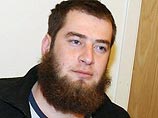
Kadyrov Faces Fresh Accusations of Ordering Hits Abroad
Kadyrov Faces Fresh Accusations of Ordering Hits Abroad
Kavkaz TV, the video arm of Kavkaz-Center, the radical Islamist Chechen rebel website, this past week posted a video clip in which a young Chechen man, Ruslan Khalidov, claimed that Chechen President Ramzan Kadyrov employed him to kill Magomed Ocherhadji, a leader of the large Chechen exile community in Norway.
As Radio Free Europe/Radio Liberty (RFE/RL) reported on March 5, Khalidov said in the video that he did not carry out the killing but that he had been tortured and threatened in an attempt to force him to comply. “They even did things that I’m ashamed to talk about,” he said, adding: “They blackmailed me with [sic] video footage of me. They told me if I didn’t accomplish the mission, they would post that video on the Internet.”
Khalidov said that he is a nephew of Shaa Turlaev, who worked as the bodyguard of the late Chechen separatist leader Aslan Maskhadov before defecting to the pro-Moscow Chechen camp after being wounded and taken prisoner. According to RFE/RL, Turlaev was reportedly in Vienna immediately prior to the murder of Umar Israilov, the former rebel fighter who was forced to become a member of Kadyrov’s bodyguard unit. Israilov subsequently fled Chechnya and accused Kadyrov of torture in a complaint to the European Court of Human Rights before being shot to death in the Austrian capital on January 13, as the New York Times was preparing to publish as story detailing his accusations against Kadyrov (North Caucasus Weekly, January 15, 23, 30; February 6, 12 and 26).
RFE/RL quoted Khalidov as saying in the video clip that Turlaev now presides over a private prison in the town of Gudermes in which relatives of suspected armed militants—including “fathers, mothers, sisters, and brothers”—are tortured. Khalidov also claimed that Turlaev supervises a band of professional killers that was set up by Kadyrov on orders from the Federal Security Service (FSB) and tasked with assassinating Chechens abroad. RFE/RL quoted Khalidov as saying in the video that he was also ordered by Kadyrov to establish contacts with Norwegian authorities and provide them with disinformation incriminating Chechens living in Norway.
RFE/RL quoted Ocherhadji, the Norway-based Chechen exile that Khalidov was allegedly ordered to kill, as saying that Khalidov had personally informed him of the plot against him, telling him that Kadyrov and his people viewed him “as a threat” and were afraid to travel to Norway because of him.
When the New York Times broke the story about Israilov’s accusations against Kadyrov in January, the newspaper quoted from a statement given last year to Austria’s Office for the Protection of the Constitution and Action against Terrorism by a 41-year-old Chechen identified as Artur Kurmakayev, who claimed that he had been sent to Vienna by Kadyrov to bring Israilov home, “by the use of force if necessary,” and that he worked for a “secretive department” under Kadyrov charged with repatriating Chechens in exile. Kurmakayev also claimed he had seen a list at Kadyrov’s residence in Gudermes of approximately 5,000 Chechens who had either fought against Kadyrov or had “otherwise attracted unfavorable attention,” and that 300 of those on the list were targeted for assassination, including about 50 Chechens living in Austria (North Caucasus Weekly, January 15).
Meanwhile, Turkish media reported on March 1 that Turkey’s National Intelligence Organization (MIT) has launched a probe into the murder of three Chechen resistance “leaders” in Istanbul over the last six months and that it suspects “Russian involvement” in the killings. The daily Turkish newspaper Vatan reported that the latest of the three murders took place on February 27, when a person identified as a “Chechen commander” was murdered in front of his house in Istanbul’s Zeytinburnu district. Vatan reported that the MIT believes the three were killed “by Russians” and that the intelligence agency was briefed about the killings on February 28 by a newly-formed police investigation unit. Sabah reported that all three victims were killed in front of their houses by killers using a MSP Groza silent pistol, which has been used by Russian spetsnaz and other special services personnel for assassinations since the 1970s (North Caucasus Weekly, December 18, 2008; see Mairbek Vatchagaev’s article in this issue).


